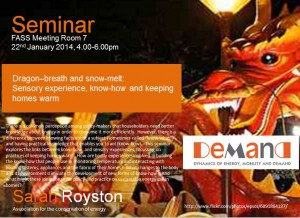 What does it mean to know about energy? Since energy is invisible various devices are required to reveal it and make it knowable (meters; or thermometers to measure the effect of energy consumption for temperature). Different issues arise if we switch focus and ask about the kind of knowing involved in doing things that use energy (operating central heating, collecting and burning wood, managing a solar panel, heating the bath water). Knowing how to keep warm is not the same as knowing how much energy has been used, or knowing that the room is hot. Knowing how is about the physical, practical and often embodied, sensory process of doing.
What does it mean to know about energy? Since energy is invisible various devices are required to reveal it and make it knowable (meters; or thermometers to measure the effect of energy consumption for temperature). Different issues arise if we switch focus and ask about the kind of knowing involved in doing things that use energy (operating central heating, collecting and burning wood, managing a solar panel, heating the bath water). Knowing how to keep warm is not the same as knowing how much energy has been used, or knowing that the room is hot. Knowing how is about the physical, practical and often embodied, sensory process of doing.
With these ideas in place, Sarah went on to consider the way that objects and devices displace, delegate and distribute systems of know-how: for instance control systems change the meaning and substance of know-how: where does it lie, what does it entail? Equally, the material infrastructures of different homes call for different forms of knowing-how: knowing how to use a draught excluder is only relevant if there are gaps under the doors. Some people can smell when their radiator is on. Some homes are like motor boats – switch them on and they ‘work’: others are like sailing ships, in which the rigging has to be constantly adjusted; many are a bit of both. As Sarah explained, advice web-sites are full of tips and tricks and are in a sense carriers of know how that has been made explicit. The discussion looped around these issues, exploring questions of knowledge deficits of different types, and thinking about how forms of know-how change, lie dormant (e.g. knowing how to light a fire or season logs) and emerge.

